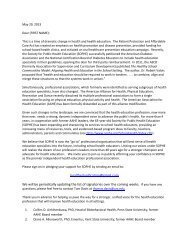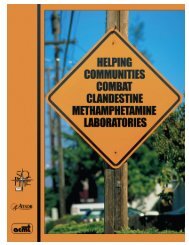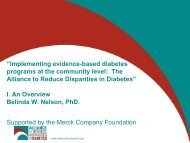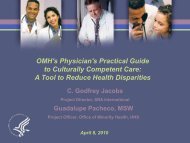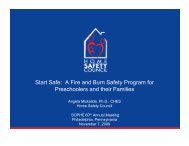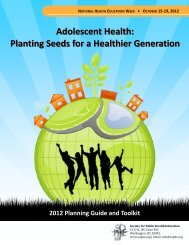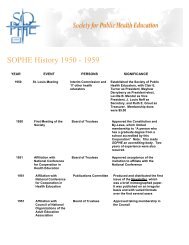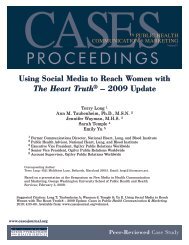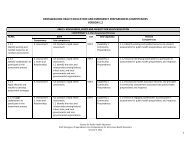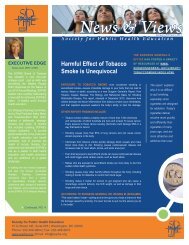to view the program - Society for Public Health Education
to view the program - Society for Public Health Education
to view the program - Society for Public Health Education
Create successful ePaper yourself
Turn your PDF publications into a flip-book with our unique Google optimized e-Paper software.
<strong>Health</strong>care and Community Approaches <strong>to</strong> Improving <strong>Health</strong><br />
Literacy With Vulnerable Senior Populations – The Sou<strong>the</strong>ast<br />
Pennsylvania Regional Enhancements Addressing Disconnects in<br />
Cardiovascular <strong>Health</strong> Communication (READS) Project<br />
Rob Simmons, DrPH, MPH, CHES, CPH, Thomas Jefferson<br />
University, School of Population <strong>Health</strong>; James Plumb, MD, MPH,<br />
Thomas Jefferson University, Dept. of Family and Community<br />
Medicine; Rickie Brawer, PhD, MPH, CHES, Thomas Jefferson<br />
University and Hospital; Patricia Yurchick, RN, MBA, CPHQ, The<br />
<strong>Health</strong> Care Improvement Foundation; Kate Flynn, FACHE, The<br />
<strong>Health</strong> Care Improvement Foundation<br />
The limited level of health literacy is a serious and escalating public<br />
health issue. Consumers must be proficient in health literacy <strong>to</strong> lead<br />
healthy lifestyles, <strong>to</strong> effectively navigate <strong>the</strong> healthcare system, and<br />
<strong>to</strong> advocate <strong>for</strong> <strong>the</strong>ir health needs. The <strong>Health</strong> Care Improvement<br />
Foundation (HCIF), in collaboration with Thomas Jefferson<br />
University and Hospital in Philadelphia has organized a coalition<br />
<strong>to</strong> address health literacy in Sou<strong>the</strong>ast Pennsylvania. Its goals are <strong>to</strong><br />
identify, implement and evaluate educational and systems changes<br />
<strong>to</strong> enhance <strong>the</strong> cardiovascular (CVD) health literacy needs of adults<br />
aged 50+, and improve <strong>the</strong>ir ability <strong>to</strong> communicate effectively with<br />
healthcare providers/staff at multiple points of care <strong>to</strong> promote <strong>the</strong>ir<br />
ability <strong>to</strong> effectively act on cardiovascular health in<strong>for</strong>mation. This<br />
regional project incorporates best practices and chronic disease prevention<br />
competencies in health literacy training and patient empowerment<br />
activities <strong>to</strong> enhance <strong>the</strong> quality and safety activities in health<br />
systems and hospitals. Its work focuses on health literacy as a key<br />
determinant underlying disparate outcomes in hypertension, coronary<br />
artery disease, congestive heart failure and stroke with an emphasis on<br />
low income and diverse populations including non-English speaking<br />
patients and consumers. The model guiding this work is <strong>the</strong> Expanded<br />
Chronic Care Model which combines Wagner’s Chronic Care Model<br />
with <strong>the</strong> Institute of <strong>Health</strong>care Improvement’s Triple Aim Initiative<br />
emphasizing system change, <strong>the</strong> patient and provider care experience,<br />
and improved outcomes. The anticipated impact includes :1)<br />
Institutionalization of effective communication materials and strategies<br />
in<strong>to</strong> <strong>the</strong> culture of patient quality and safety; 2) A centralized educational<br />
materials reposi<strong>to</strong>ry; 3) Reduced CVD related readmissions;<br />
4) Reduced CVD medical errors; 5) Improved CVD patient disease<br />
management/ self-care behaviors; 6) Increased patient and provider<br />
satisfaction with health communication; 7) Policy changes that support<br />
patient-centered health care services; 8) Improved cardiovascular<br />
health outcomes. The Coalition and its professional and community<br />
advisory groups will create new materials, <strong>program</strong>s and polices/<br />
systems that support and enhance <strong>program</strong>s and activities including<br />
managing medications, coaching/handoffs, and personal health records<br />
as examples <strong>to</strong> take <strong>to</strong> scale in hospital/health systems as well as integrating<br />
literacy improvement techniques and strategies, such as Teach<br />
Back, Plain Language, Creating a Shame Free Environment, and<br />
Ask Me 3 via <strong>to</strong>olkits, staff development, training of trainers, patient<br />
activation, and <strong>the</strong> use of peer educa<strong>to</strong>rs. Mini-grants <strong>to</strong> healthcare<br />
organizations and community agencies will be a key mechanism <strong>for</strong><br />
<strong>program</strong> development, implementation, and evaluation. An over<strong>view</strong><br />
of <strong>the</strong> initiative will be presented along with <strong>to</strong>ols and resources.<br />
Passing Policy-The Game Changer <strong>for</strong> <strong>Health</strong>ier Communities<br />
Tracy Wiedt, MPH, YMCA of <strong>the</strong> USA<br />
The YMCA of <strong>the</strong> USA (Y-USA) began <strong>the</strong> <strong>Health</strong>ier Communities<br />
Initiative (HCI) <strong>to</strong> engage community leaders, convened by local<br />
YMCAs, in policy change ef<strong>for</strong>ts that support and promote healthy<br />
lifestyles. These initiatives empower local communities with proven<br />
strategies and models <strong>to</strong> create and sustain positive, lasting change <strong>for</strong><br />
healthy living. Three distinct projects encompass HCI – Pioneering<br />
<strong>Health</strong>ier Communities (PHC), Statewide Pioneering <strong>Health</strong>ier<br />
Communities (Statewide PHC) and Action Communities <strong>for</strong> <strong>Health</strong>,<br />
Innovation, and EnVironmental ChangE (ACHIEVE). Nearly 200<br />
Ys have contributed <strong>to</strong> <strong>the</strong> initiative through multi-sec<strong>to</strong>ral, organically<br />
grown, local strategies addressing <strong>the</strong> needs of communities<br />
nationwide. Local ef<strong>for</strong>ts have led <strong>to</strong> large scale impacts including:<br />
increased access <strong>to</strong> and use of attractive and safe locations <strong>for</strong> physical<br />
activity; supportive environments <strong>to</strong> complement and support individual<br />
and family ef<strong>for</strong>ts <strong>to</strong> make health decisions; increased healthy<br />
food choices in restaurants, grocery s<strong>to</strong>res, worksites, schools and<br />
o<strong>the</strong>r community settings; and reduced inequities in health and access<br />
<strong>to</strong> opportunities. Y-USA’s HCI is joined and supported by national<br />
organizations such as <strong>the</strong> <strong>Society</strong> <strong>for</strong> <strong>Public</strong> <strong>Health</strong> <strong>Education</strong>, Robert<br />
Wood Johnson Foundation, American Planning Association and Trust<br />
<strong>for</strong> America’s <strong>Health</strong> as well as federal agencies including <strong>the</strong> Centers<br />
<strong>for</strong> Disease Control and Prevention. Recent evolutions of <strong>the</strong> initiative<br />
comprise <strong>the</strong> Pioneering <strong>Health</strong>ier Communities <strong>Health</strong> Equity<br />
<strong>program</strong> (PHC-HE) and <strong>the</strong> Sou<strong>the</strong>rn States Strategy <strong>to</strong> fur<strong>the</strong>r<br />
engage and build capacity in those communities with <strong>the</strong> greatest burden<br />
of chronic disease. Y-USA will present <strong>the</strong> overarching national<br />
perspective of all three projects, <strong>the</strong> various iterations, <strong>the</strong> vision <strong>for</strong><br />
<strong>the</strong> initiative, as well as <strong>the</strong> current and projected outcomes on <strong>the</strong><br />
health of communities participating in HCI. Local HCI initiatives<br />
will be highlighted <strong>to</strong> illustrate <strong>the</strong> impact of policies on health and<br />
well-being while demonstrating <strong>the</strong> actions taken <strong>to</strong> accomplish changes<br />
in <strong>the</strong> game.<br />
SOPHE-NACDD 2011 Joint Academy and Midyear Scientific Meeting 35




